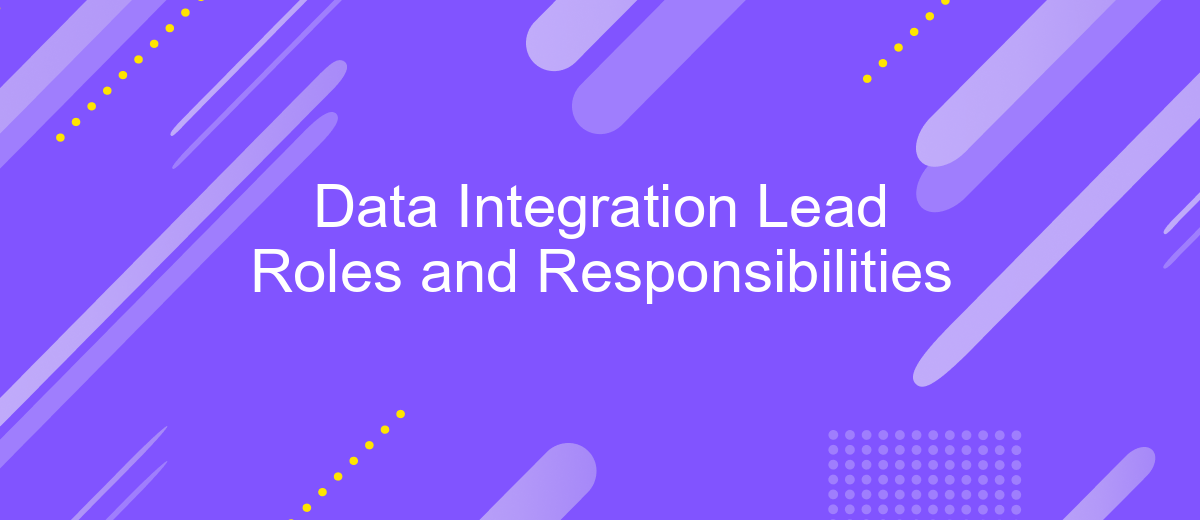Data Integration Lead Roles and Responsibilities
In today's data-driven world, the role of a Data Integration Lead has become indispensable for organizations striving to harness the full potential of their data assets. This article delves into the key responsibilities and skills required for a Data Integration Lead, highlighting how they ensure seamless data flow, enhance data quality, and support strategic decision-making processes.
Introduction
Data integration has become a cornerstone in the modern business landscape, enabling organizations to unify disparate data sources for comprehensive analysis and decision-making. The role of a Data Integration Lead is pivotal in orchestrating these efforts, ensuring seamless data flow across various platforms and systems. This position demands a unique blend of technical expertise, strategic vision, and leadership skills.
- Developing and implementing data integration strategies
- Managing data integration projects and teams
- Ensuring data quality and consistency across systems
- Collaborating with stakeholders to understand data requirements
- Monitoring and optimizing data integration processes
In essence, the Data Integration Lead serves as the linchpin between the technical and business aspects of data management. By effectively coordinating resources and aligning data initiatives with organizational goals, they play a critical role in driving business intelligence and operational efficiency. Their contributions not only enhance data accessibility but also empower decision-makers with timely and accurate insights.
Key Roles and Responsibilities

The Data Integration Lead plays a pivotal role in managing and orchestrating the seamless integration of data across various systems. They are responsible for designing robust data integration strategies, ensuring data accuracy, and maintaining data consistency. This role also involves collaborating with cross-functional teams to identify integration requirements and implementing solutions that align with the organization's goals. A Data Integration Lead must stay updated with the latest technologies and best practices to optimize data workflows and enhance overall efficiency.
Additionally, the Data Integration Lead oversees the implementation of integration tools and platforms such as ApiX-Drive, which facilitate the automation and synchronization of data between different applications. They are tasked with monitoring the performance of these integrations, troubleshooting any issues that arise, and continuously improving the integration processes. Effective communication skills are essential, as the Data Integration Lead must convey technical concepts to non-technical stakeholders and ensure that all integration efforts are aligned with business objectives.
Hard and Soft Skills Required

For a Data Integration Lead, a blend of hard and soft skills is essential to ensure successful project execution and team collaboration. These professionals must possess a robust technical foundation as well as strong interpersonal abilities to navigate complex data environments and lead diverse teams effectively.
- Technical Proficiency: Expertise in data integration tools, ETL processes, SQL, and data warehousing.
- Analytical Skills: Ability to analyze complex data sets and derive actionable insights.
- Project Management: Experience in managing projects, timelines, and resources efficiently.
- Problem-Solving: Strong aptitude for identifying and resolving technical issues quickly.
- Communication: Excellent verbal and written communication skills to articulate technical concepts to non-technical stakeholders.
- Leadership: Proven ability to lead and mentor teams, fostering a collaborative work environment.
- Adaptability: Flexibility to adapt to changing technologies and project requirements.
Combining these hard and soft skills enables a Data Integration Lead to bridge the gap between technical execution and strategic planning, ensuring that data initiatives are aligned with business goals and delivered successfully.
Career Path and Advancement Opportunities

The role of a Data Integration Lead is a pivotal one in any organization, serving as the bridge between various data sources and business needs. Starting as a Data Integration Specialist or Analyst, professionals can gain hands-on experience in data mapping, ETL processes, and database management. With demonstrated expertise, they can move up to a Data Integration Lead position, where they oversee projects and mentor junior team members.
Advancement in this field often requires a combination of technical skills, leadership abilities, and a deep understanding of business processes. Continuous learning through certifications and advanced degrees can also play a significant role in career progression.
- Data Integration Specialist
- Data Integration Analyst
- Data Integration Lead
- Data Architect
- Chief Data Officer (CDO)
With each step up the career ladder, professionals can expect to take on more strategic responsibilities, such as designing enterprise-wide data strategies and ensuring data governance. The ultimate goal for many is to reach executive-level positions, where they can influence the overall data strategy and drive business growth through effective data integration and management.
Conclusion
In conclusion, the role of a Data Integration Lead is pivotal in ensuring seamless data flow across various systems and platforms. Their responsibilities encompass not only the technical aspects of integrating disparate data sources but also the strategic planning and management of these integrations. By leveraging tools like ApiX-Drive, they can automate and streamline the integration process, reducing manual effort and minimizing errors. This enables organizations to make better-informed decisions based on accurate and timely data.
Moreover, a successful Data Integration Lead must possess strong leadership skills to coordinate with cross-functional teams and stakeholders. They must also stay updated with the latest technologies and best practices in data integration to continuously improve processes. Ultimately, their expertise and proactive approach significantly contribute to the organization's efficiency, data quality, and overall success. As the demand for robust data integration solutions grows, the importance of this role cannot be overstated.
FAQ
What is the primary role of a Data Integration Lead?
What are the key responsibilities of a Data Integration Lead?
How does a Data Integration Lead ensure data quality and integrity?
What skills are essential for a Data Integration Lead?
What tools can a Data Integration Lead use for automating and configuring integrations?
Strive to take your business to the next level, achieve your goals faster and more efficiently? Apix-Drive is your reliable assistant for these tasks. An online service and application connector will help you automate key business processes and get rid of the routine. You and your employees will free up time for important core tasks. Try Apix-Drive features for free to see the effectiveness of the online connector for yourself.

